Why is it so difficult to start a new business? Why do so many fail? There are probably a lot of answers to these questions, but I think the problem looks very similar once a business gets past its early incubation phase and starts to struggle as its success causes it to rapidly grow. This "struggle to scale" phase seems to hit most startups at the 3 to 5 year mark and are probably the most painful and stressful times to own a company.
Our digital agency hit this inflection point right around the 4 year mark. Up to that point we had been experiencing consistent growth of our team and client base, with no indication of that upward trend slowing down. However, we started to notice some patterns of pain starting to arise as we scaled.
First, as we grew from 35 to 40 people we hit some upper limit where my partner and I could not be in every single client meeting and team standup. That in itself shouldn't have been an issue because we had an extremely talented and motivated team. However we started to notice problems with culture, client satisfaction, and ultimately project delivery piling up over the course of a quarter. This created a terrible feedback loop where my partner and I flipped into firefighting mode - running around spending our time in problem areas helping teams get back on track, further neglecting other engagements.
This unhealthy cycle resulted in serious stress on us as partners, spilling over into our relationship and personal lives. There were a number of times when I considered walking away from the business, which was ironically quite successful from an external lens. It was only because of a great business partner and marriage that I managed to hang on long enough to see our team size shrink and things get to a comfortable normalcy. That helped me come to the realization that our stress only existed above a 35 person threshold. I didn't understand what exactly was going on, but I had a clear problem to tackle.
I began what felt like a treasure hunt for the best set of business acumen building books out there that could help me understand what was happening to us. I ended up reading about 2 books per month over the course of 2 years until I found a set of authors and books that helped me gain a perspective on entrepreneurship that changed my life and the course of our business. At this point I have a set of 6 go-to books that I review on a regular basis and have formed the basis for my current business philosophy.
I wanted to share this list with anyone who is either running a business or thinking about running one. I find that the learnings I've gleaned from these books provide value to all aspects of life. I haven't listed the the books in any particular order, however I will attempt to provide a bit of context to help readers identify what I think are the lessons each book uniquely provides.
The E-Myth Revisited
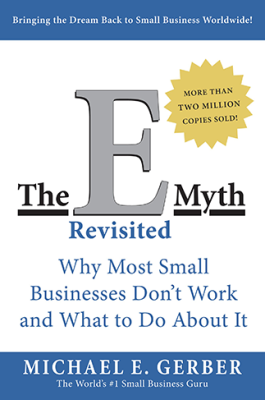
This was the first book I read that not only resonated with me deeply, but also started to clearly explain why I was personally struggling with my business despite the success it was having. One of the central points he makes is the significant difference between working on your business versus working in your business.
I love working with our product teams as we design and build digital products, so I tend to spend most of my working day in the trenches providing leadership and expertise for our teams. The problem with this approach is that I wasn't spending any time understanding those leadership activities and building up that capacity outside of myself. As a result I was spending time firefighting the side effects of a lack of leadership instead of teaching others how to lead.
Gerber does an excellent job of describing the general path that most people take as they start a new business and why it inevitably leads to stress and frustration. I was building a business that was great when I was present and terrible when I wasn't, and it was freaky to see how accurately he described my experience in his book.
Good to Great
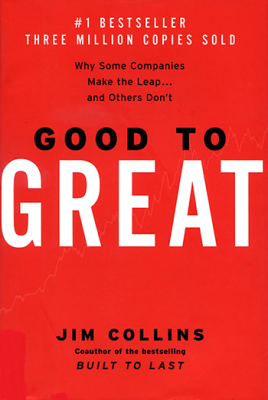
Jim Collins is by far my favourite author on the subject of organizational design. When I first read this book I had already developed a set of guiding leadership and culture principles: be real with the people you work with and take care of them like they're family. That approach seems so intuitive and natural, but often runs contrary to mainstream business management philosophy.
I was beginning to wonder if I was fundamentally wrong in my business approach until I read this book.
As we were facing our growth challenges there was a tremendous internal pressure to switch our people-first philosophy in lieu of a number of other popular models. It is easy to assume that your fundamental approach is off if the results aren't what you'd like to see. However, Collins has a concept called the Flywheel Effect that describes how great businesses have a pattern of sticking to core strategies that they know are right and being patient and persistent in nurturing them. This insight helped us push through the two years of turmoil that were required to refine and ultimately validate our approach to our people processes, structures, and culture.
Good to Great provides a set of timeless principles and qualities that have helped build winning organizations regardless of sector or industry. Many of the principles deal with leadership and culture, and they're backed by a number of clear examples.
Great by Choice
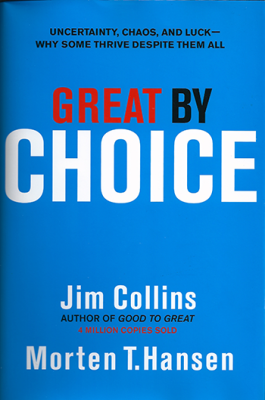
Similar to Good to Great, this book identifies what makes top organizations outshine their already successful counterparts. The main difference between this book and its predecessor is the context. Great by Choice examines what makes certain companies not only survive, but actually thrive, when business conditions are unfavourable and unpredictable.
We are in the business of building custom digital products from the ground up, often using emerging technologies. Many of our firefighting moments resulted from unpredictable events like flaws in the bleeding-edge technology we were using, stakeholders making major changes in requirements, or user experience issues when products went out into the wild.
In our early days we had always approached product development in small iterative slices, so that we could expose risks and opportunities as we worked. It gave our clients a chance to provide input as the product developed and offered the flexibility of responding to issues that only became apparent once you had something in your hands. However as we scaled, our teams brought in more traditional agile practices broke that model.
Collins has a concept in this book called Fire Bullets, Then Cannonballs that helped us recognize this difference and correct it. We have since replaced the traditional agile process of backlog grooming and sprint planning with a process that better resembles our earlier days where we felt more like craftspeople than a manufacturing plant.
Leaders Eat Last
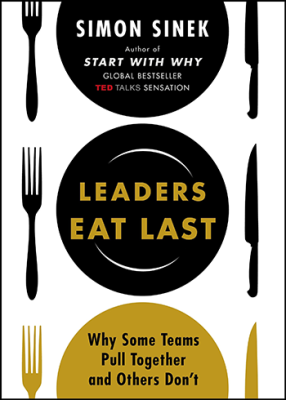
Most people have heard of Sinek's leadership book Start with Why, but few have heard of his other book Leaders Eat Last. This book does a great job of connecting team culture and behaviour to much deeper human emotional and biological systems that have evolved in us over the years.
I've always believed that at its best a company is just a group of people that are working together towards a shared goal, no different than friends or family. My core management philosophy builds on that idea, trying to align our organizational processes, structures and values to match those found in families and friends - systems that have evolved since the dawn of humanity and proven their effectiveness over time.
It was increasingly difficult to use our mental models for friends and family as our organization scaled. There is a tendency and pressure to want to put structures, processes, and role definitions in place once you grow beyond 10 people. Structure isn't inherently bad, but if not done right it can suck the heart and soul out of your culture as things become hierarchical and robotic. We had started to fall into this trap and as a result people were starting to be treated like employees instead of family.
This book helped us understand what we were starting to lose from our early days - that sense of belonging and connection with each other as a unified team. The basic idea of leaders taking care of their people became a north star that helped us figure out how we should refactor our processes and roles to deal with the scale that you don't really find in families.
Radical Candor
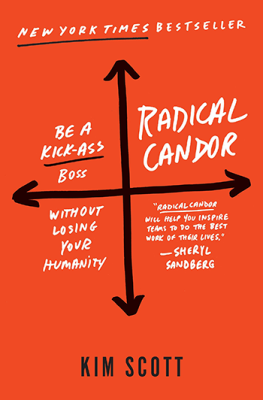
We have always been a very candid and caring organization, so when I first came across Radical Candor I quickly shuffled it to the bottom of my reading list, thinking there weren't going to be too many new management tips to discover. Months later I recognized the hubris of that decision when I discovered the rich and applicable lessons that Kim Scott brings in this book - the most significant insight being the concept of superstars versus rockstars. Superstars are your people who embrace failure and are always pushing to learn and evolve. Rockstars are your high performers, the people that you can count on to hold the team together.
Over the years I had noticed a pattern where a talented individual would join the organization, love what we do for a while, but then eventually struggle to deal with the dynamic demands of tackling one new problem after another as we continually push innovation and digital transformation. Their struggle had varied forms, ranging from adapting to a change in our design process to adopting a new technology stack. The end result was the same: they would struggle for months or years, grow demoralized, then eventually leave.
My mind was blown when I first read Kim's thoughts on how an individual's ability to do great work should be decoupled from their desire to learn and grow. This is partly because I'm an extremely growth-focused individual by nature, so it had been inconceivable to me that someone who loved what they do wouldn't be excited to learn and develop new skills. That blindspot had made it impossible for me to diagnose the problem that we were having until reading the concept of rockstars, which made me realize that there are times when people just need to be valued for the skills they already have.
The Power of Habit
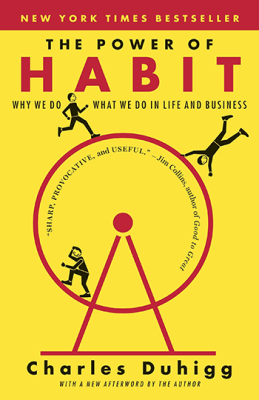
There have been many moments over the years, inside and outside of work, where I observe a very intelligent person consistently making poor decisions regardless of how many times it is pointed out. This can take the form of always interrupting others, never speaking up when they know they should, lacking attention to detail, shutting down when challenged, etc.
In most cases when you dig into why these self-defeating behaviours are being repeated, you begin to realize that there isn't a conscious decision around the shortcoming - it's just something that we do in response to a situation without thinking about it. The interesting thing is that some of the top performers consistently make winning decisions in like manner: they speak up without hesitation, they double-check their work, they always come prepared for meetings, etc.
The Power of Habit is Charles Duhigg's seminal exploration into the science of habits that explains why most of what we do isn't a conscious decision, but a much more primitive stimulus and response cycle. Our company hadn't taken time to understand the good habits that we had formed when we were smaller, so as we scaled we had teams forming their own habits organically which was causing quite a bit of chaos.
We started to take the time to understand ourselves and the habits associated with successful teams, and then establish those habits across our organization.
Fast forward 5 years since I first ran into scalability issues and a lot has changed. We spend a lot more time as a leadership team talking about our processes, performance, and most importantly people. While I still experience the occasional moment of stress I am a lot quicker to identify the root cause and turn that into an interesting problem to tackle. We have been much more thoughtful about when and how we grow as a team, making sure that we never the lose the essence of our culture as we scale.

